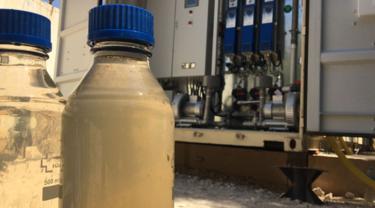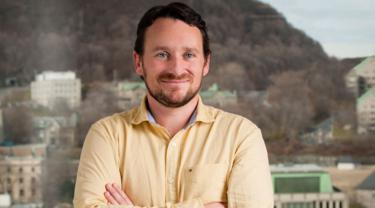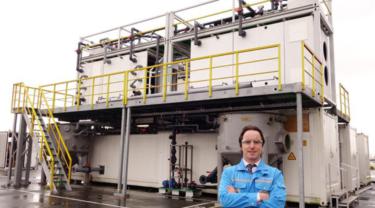
P.E.I.’s Island Water Technologies brings cleantech to Algerian desert
Patrick Kiely could not have chosen a more challenging location for his company’s first export project: a town in the middle of the Algerian desert in Northern Africa.
But the founder and CEO of Prince Edward Island-based Island Water Technologies (IWT) knows the firm’s continued success as an exporter depends on filling orders in unusual places.
IWT is a wastewater technology company focused on developing low-energy or renewable powered solutions for remote populations. Target markets for its REGEN mobile wastewater treatment solution include military bases, disaster relief operations, mining camps and off-grid communities.
IWT has positioned itself at the intersection of two of the world’s major challenges – renewable energy and wastewater treatment.
“Our goal is to provide a technology development ecosystem that is focused on continuing to identify needs and provide solutions for customers that are both economically and environmentally sustainable,” says Kiely. “And that’s precisely what the Algerian project achieved.”
The company’s first export success began when its capabilities attracted the attention of Algeria’s REDMED Group, a company that provides a full suite of camp solutions to the work camp and mining industry across Algeria. REDMED and IWT identified a need for improved mobile wastewater treatment solutions for remote work camps.
Existing solutions are energy intensive, difficult to operate and typically require regular addition of chemicals.
“Our initial discussions identified a number of key factors for consideration in designing a custom wastewater treatment solution,” says Kiely. “These included a requirement for no chemical addition, low-complexity operation, mobile andeasily installed in remote locations and it needed to have a low-energy footprint.”
He points out that most remote camps incur significant costs for wastewater haulage or have issues with poorly performing installed packaged plants.
The first site chosen for the installation of IWT’s system was REDMED’s headquarters in Hassi Messaoud, Algeria.
The site had an existing wastewater collection system serving a year-round population of 250 to 350 people. Wastewater was routinely hauled by trucks, at considerable expense, to the regional treatment plant. IWT’s REGEN system installation was completed in three days.
Kiely says REGEN’s competitive advantage is that the technology has the lowest energy requirement for wastewater treatment in the industry and if required, can be completely powered by renewable energy.
“The modular systems can be installed in remote locations where there is limited electricity and can be monitored remotely in real-time for ease of maintenance and compliance,” he explains.
He points out that in the developed world wastewater treatment consumes up to three per cent of all electrical energy.
“The industry standard to date has relied on large-scale centralized treatment systems. These require significant energy and expense to move and process wastewater,” says Kiely. “Next generation, decentralized treatment solutions offer the potential to drastically reduce the energy footprint of wastewater treatment, and service a wide range of communities.”
IWT’s path to its first export market was founded on a clear understanding of that market, he adds.
“From a technical perspective our senior team had identified major flaws in the wastewater infrastructure that is currently installed,” says Kiely. “There was very little effort to reduce energy cost, decentralized wastewater solutions were underdeveloped and under utilized, and remote connectivity and remote control of processes was pretty much nonexistent.”
IWT’s team understood that low-energy or self-powered and self-operating wastewater treatment infrastructure was, in fact, a very real possibility and that IWT could make it happen.
“Our current market for the REGEN wastewater treatment system is remote work camps,” says Kiely. “Basically anyone having to spend in excess of $70,000 per annum disposing of their sewage wastewater from remote work camps.”
By developing a world-first packaged wastewater treatment system that requires no chemicals and reduces electricity use by up to 90 per cent, REGEN provides massive benefits for remote work camp operators, and provides clean water for re-use on-site in irrigation for example, adds Kiely.
But cracking the export market came with its challenges.
“Our key benefits relate to lifecycle costs of the installed infrastructure,” explains Kiely. “Demonstrating to a client that if they can spend a little bit more up-front it will save them in the long-run is always a difficult sell, especially to remote camp operators. This means we need to look at financing options or provide service agreements with the installed infrastructure where we can benefit the client in the long-run.”
Finding partners who believed in the company’s potential was also important. Last year, IWT secured $250,000 in venture capital from Halifax, Nova Scotia-based investor Innovacorp to commercialize REGEN.
Michael Dennis, Innovacorp investment manager said at the time that wastewater treatment is critical in protecting people’s health and the environment from the potentially harmful effects of human sewage and industrial wastewater.
“Global sales of equipment to treat wastewater are forecasted to surpass US$53-billion by 2020, and IWT is developing unique and potentially disruptive technologies for this extensive market,” he added.












